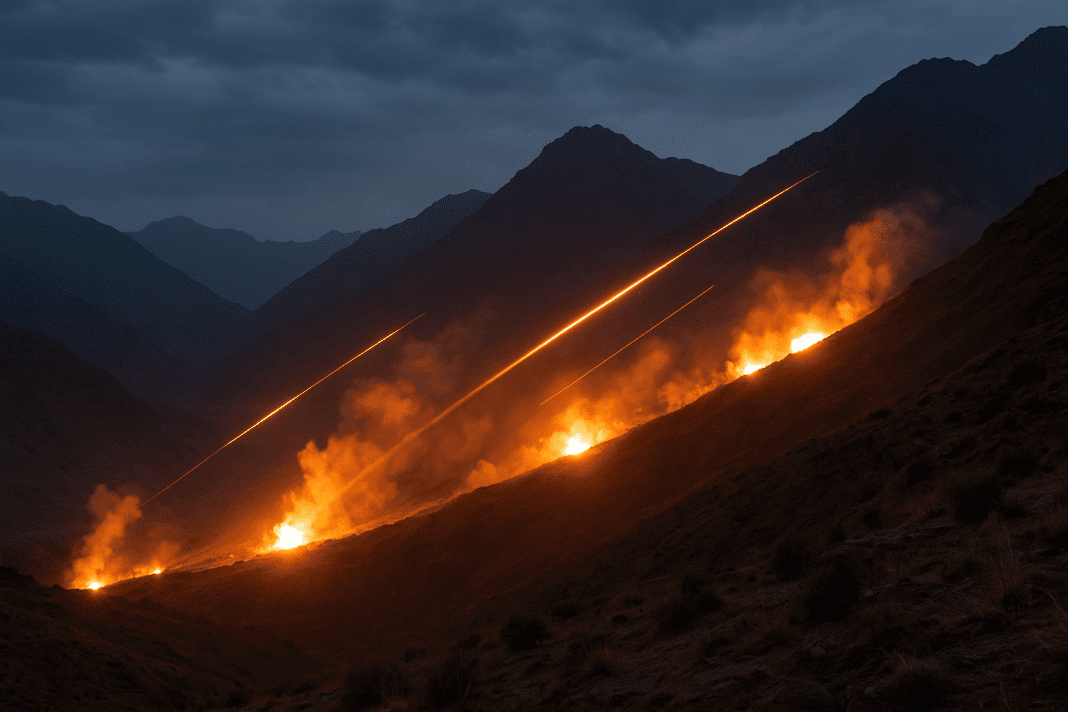A fierce clash erupted overnight between the militaries of Afghanistan, under the Taliban government, and Pakistan, marking one of the most intense confrontations between the neighboring countries in recent years. The violence, which unfolded along their shared mountainous border, began late Saturday and continued into early Sunday. Both sides exchanged heavy artillery and gunfire, leading to fears of a broader conflict.
Rising Tensions Along a Taliban-Controlled Border
The fighting came shortly after deadly attacks last week in Kabul and a nearby border market. The Taliban government in Afghanistan blamed Pakistan for those strikes, accusing it of violating Afghan airspace and targeting civilians. In retaliation, Afghan forces under Taliban authority launched strikes on Pakistani military outposts along the frontier, claiming to have destroyed several positions and caused heavy losses.
Pakistani officials confirmed that their troops had responded to the attacks and engaged Afghan positions but offered limited details. Reports from both sides described intense exchanges that lit up the night sky and could be heard miles away. Civilians living in border districts described the sounds of heavy weapons and gunfire that lasted for several hours.
Fierce Taliban Warning to Marco Rubio After U.S. Bounty Proposal
The situation has drawn immediate concern from regional powers. Countries such as Qatar, Saudi Arabia, and Iran have urged both sides to show restraint and prevent further bloodshed. Meanwhile, India, which recently expanded its diplomatic ties with the Taliban government, has not issued a statement on the matter.
Border Crossings Shut Down After Fierce Fighting
Major border crossings between the two countries, including Torkham and Chaman-Spin Boldak, have been closed following the overnight violence. These crossings are crucial for trade and movement between Afghanistan and Pakistan, and their closure has caused significant disruption for travelers and merchants on both sides.
The Afghan Taliban said its operations were a response to Pakistani airstrikes that targeted a border market on Thursday, causing civilian deaths. It described its overnight attacks as “retaliatory operations” to defend national sovereignty. Taliban officials claimed their forces had taken control of several border posts after intense fighting.
Pakistan, however, described the Afghan actions as unprovoked aggression. Its military stated that it had carried out “retribution operations” to target militant groups operating from Afghan soil. Pakistan has long accused Afghanistan of sheltering the Tehreek-e-Taliban Pakistan (T.T.P.), a banned militant organization responsible for numerous deadly attacks inside Pakistan.
UN Gives Pakistan the Reins: Leads Sanctions Watchdog Targeting Taliban Financiers
Over the past week, the T.T.P. has claimed responsibility for multiple attacks in Pakistan’s Khyber Pakhtunkhwa province, which borders Afghanistan. These attacks included bombings and assaults on police facilities, killing both security personnel and civilians. Pakistan’s military believes the group receives training and financial assistance from within Taliban-controlled Afghanistan, though the Taliban government denies these allegations.
Residents on both sides of the border have described the situation as terrifying. Many families spent the night hiding in their homes as gunfire echoed through the mountains. Witnesses reported seeing flares and explosions lighting up the night sky, with both sides using heavy weapons. Border villages were left in fear as people worried the clashes could spread.
A Fragile Taliban-Pakistan Relationship Under Strain
Afghanistan and Pakistan share a rugged 1,600-mile border known as the Durand Line, cutting through tribal regions and mountains where tensions have remained high for decades. Disputes often arise over cross-border attacks, smuggling, and new security posts.
Relations have grown increasingly hostile since the Taliban returned to power in 2021. Pakistan, once a supporter of the Taliban, now accuses Afghanistan of sheltering militants, while the Taliban government claims Pakistan violates Afghan airspace and targets civilians. These mutual accusations have led to repeated border clashes.
US rejects reports of new AMRAAM missile sales to Pakistan citing only sustainment support
The recent overnight violence intensified tensions, with both sides claiming to have captured and destroyed border posts, though these claims remain unverified. Residents near the border have faced disrupted markets, healthcare, and essential services, with many fearing further conflict.
The Durand Line has long been disputed, and while clashes are not uncommon, this week’s fighting was unusually severe. Mediation has paused active fighting, but the damage is visible in destroyed posts, closed crossings, and deepened mistrust between the neighbors.

